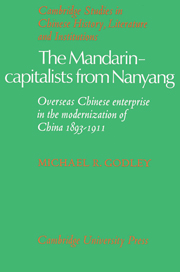 The Mandarin-Capitalists from Nanyang
The Mandarin-Capitalists from Nanyang Book contents
Summary
At the time of the Revolution in 1911, as many as ten million Chinese lived abroad. The majority were poor coolies but a minority had already moved into the business pursuits for which they are well known today. Within this group, particularly in Southeast Asia, could be found a stratum of very wealthy merchants. Because few individuals viewed their expatriation as permanent but rather sought to identify with the homeland and its culture, there had been considerable interest in the events of the late Ch'ing period. It is widely assumed that the multitude actively opposed the Manchu regime and gave its support to the reform or revolutionary movements encouraged by K'ang Yu-wei and Sun Yat-sen. This traditional conclusion is unfounded. Although most overseas Chinese had lost faith in Manchu leadership by 1909, only a small percentage took political action. In fact there was a time, forgotten by some historians, when prosperous merchants abroad wanted closer relations with the Ch'ing dynasty.
In the closing decades of the old order, the absence of a strong and independent bourgeoisie stood as a formidable obstacle to modernization. There could be no development along Western lines without an innovative entrepreneurial group, but no such element was likely to emerge in a society which had long denigrated the importance of businessmen and kept them in the shadow of the bureaucracy. Hence, it appeared at first that only foreigners could provide the capital and technical skills needed.
- Type
- Chapter
- Information
- The Mandarin-Capitalists from NanyangOverseas Chinese Enterprise in the Modernisation of China 1893–1911, pp. 1 - 6Publisher: Cambridge University PressPrint publication year: 1981
